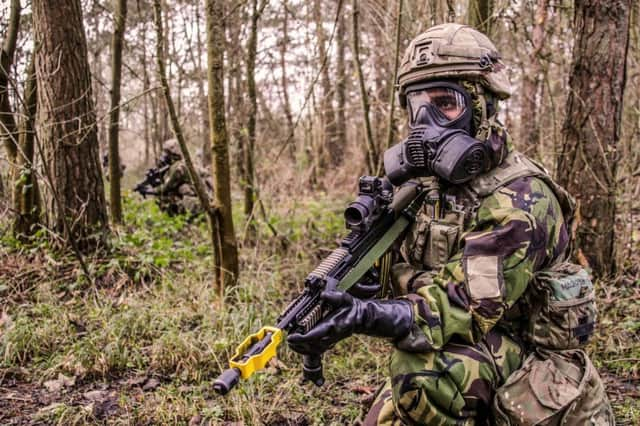Elite Scots commandos to leads against chemical warfare threat


Zulu Company from 45 Commando, based in Arbroath, will be the first marines to respond to a chemical, biological, radiological or nuclear (CBRN) incident at home or abroad.
The marines were given the training in response to the heightened threat following the nerve agent attack last March on former Russian double agent, Sergei Skripal, which left him and his daughter, Yulia, seriously ill. Detective Sergeant Nick Bailey was also hospitalised after trying to help the pair.
Advertisement
Hide AdAdvertisement
Hide AdDawn Sturgess, 44, fell ill in nearby Amesbury months after the incident in Salisbury, and died in hospital last July after coming into contact with a perfume bottle believed to have been used in the attack on the Skripals and then discarded. Her partner, Charlie Rowley, 45, was also exposed to the nerve agent but was treated in hospital and later discharged.
The Arbroath-based marines trained at the Defence Chemical Biological Radiological Nuclear Centre at Westdown Camp on Salisbury Plain in Wiltshire. This involved a week of lectures and computer-aided work, followed by a week of practical training, known as Exercise Toxic Dagger.
It culminated in a simulated attack on Imber – a deserted village used for military training, with the marines wearing protective gas masks. The former settlement was commandeered in 1943 to allow troops to prepare for the D-Day landings. It has remained the property of the Ministry of Defence ever since.
The final simulated assault staged in Imber included pyrotechnic and electronic battle simulators to make the experience as real as possible.
The CBRN training at the centre was designed to give the marines experience in the tactical planning and execution of CBRN defence measures.
The training, overseen by military and civilian specialists, also included teaching the marines how to fit, repair and maintain respirators, how to provide medical support, and the best way to gather and interpret data on possible chemical attacks.
Sergeant Ben Fail said: “The recent attack on British soil highlighted the importance of this capability and it is more important than ever for us to be able to operate effectively in this environment should the need arise.”
Lieutenant Oliver Crow, of Zulu Company, said: “The Royal Marines are high-readiness troops who need to be able to react to all threats at short notice anywhere in the world. This is a very important skill for us to maintain in view of the current threat.”
Advertisement
Hide AdAdvertisement
Hide AdIt comes as the Skripals’ home in Salisbury is set to be dismantled as decontamination work continues.
A military team will dismantle and remove the roofs on two buildings over two weeks.
Everything will be wrapped and sealed before being removed from the site, then the roofs will be replaced.
A letter sent to residents by Tracy Daszkiewicz, director of public health at Wiltshire Council, said the risk to people in the area remains low.
She said: “The priority is to make sure that the two remaining sites affected by the 2018 incidents are thoroughly cleaned and returned to normal use as soon as possible.”
Two Russian nationals have been accused of travelling to the UK to try to murder Mr Skripal with Novichok.
Evidence gathered by intelligence agencies led the UK government to conclude that the men were officers from the Russian military intelligence service, the GRU.